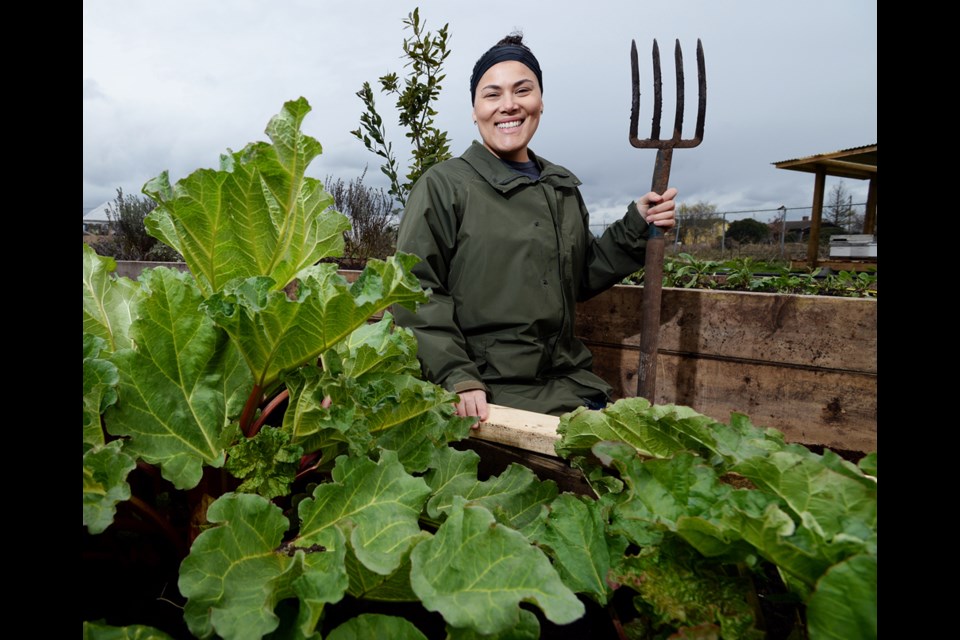You could say farming is in Leila Trickey’s genes. Her homesteader parents and five siblings lived on an Ontario farm, and her childhood was shaped by wide open spaces and fresh earth. When Trickey grew up, she moved to more urban pastures, but she still felt a nostalgia for the land.
It’s no surprise she jumped at the chance to rent a plot in the agricultural land reserve so she could grow her own food. She now runs a small farm with her partner, Dave Carlson, in Burnaby’s Big Bend area. They have goats for milking, fresh eggs, honeybees and an abundance of organic produce. They grow squash, tomatoes, cauliflower, broccoli, peppers, beans, peas, kohlrabi, fennel and kale. Some years, the two run a CSA – community supported agriculture – where investors donate money early in the year in exchange for regular produce deliveries during the harvest. Trickey recently got involved with Burnaby Food First, a food security group that runs workshops and gardening programs.
Trickey spent some time chatting with the NOW about her love for the land and homegrown food.
What do you remember fondly about growing up on the farm?
Everything. It really shaped who I am as a person, and my relationship to food. I actually started out my adult life cooking. I went to culinary arts school and then ended up going back to school after that. But it shaped my relationship with food and how I feel about food. It shaped the whole of me, the person I am. My childhood was unlike anybody else’s childhood, because we had space. We had access to food. Nobody in my family has a single allergy. We weren’t exposed to chemicals, we virtually didn’t buy food except for flour. … It really shows in our health.
How would you describe your relationship with food?
I know about food, and I understand where it comes from. That seems pretty basic, but I think I’ve always known that, even as a child, … you respect food in a different way. You respect your body in a different way because you know where certain foods come from, you know where other foods come from. Some things, if you had the choice, you wouldn’t put into your body.
Burnaby Food First is a food security organization. Can you talk a bit about that concept?
It’s the idea that people should always have access to food that’s healthy and nutritious and accessible. So people can access foods that are healthy for them, but also an extension of that is the idea of food sovereignty, so people have the right to healthy foods that are also culturally appropriate, and food security goes a long with this, too. The land isn’t being degraded in the process. People have access to food, but they are not destroying the land in the process.
What are the best things to grow in Burnaby?
Everything grows well in our garden, because it used to be a chicken farm, so the soil is really rich from the chicken poo. The longest lasting food thing we grow is kale. It lasts throughout the year, but also cauliflower, broccoli, I mean it’s hard to say. Everything we grow grows there.
What’s the most unusual thing you’ve grown?
I don’t know what I would define as unusual. When we were doing the CSA boxes, the deliveries, people were really thrown off by kohlrabi. It tastes like a cross between a turnip and a cabbage, but it’s just big either purple or green bulb with leaves on it, and people just never knew what to do with it.
Where are we in the gardening season? What should we be doing now?
Right now is the time to start growing food, but it’s not too late. I wouldn’t just throw seeds in the ground though, because we don’t know what the weather’s going to do, so I would recommend starting some seedlings in the house and putting them out when the weather turns a little bit.
For info on Trickey’s farm, go to www.commongroundfarmers.com. For more on Burnaby Food First, go to burnabyfoodfirst.blogspot.ca.



